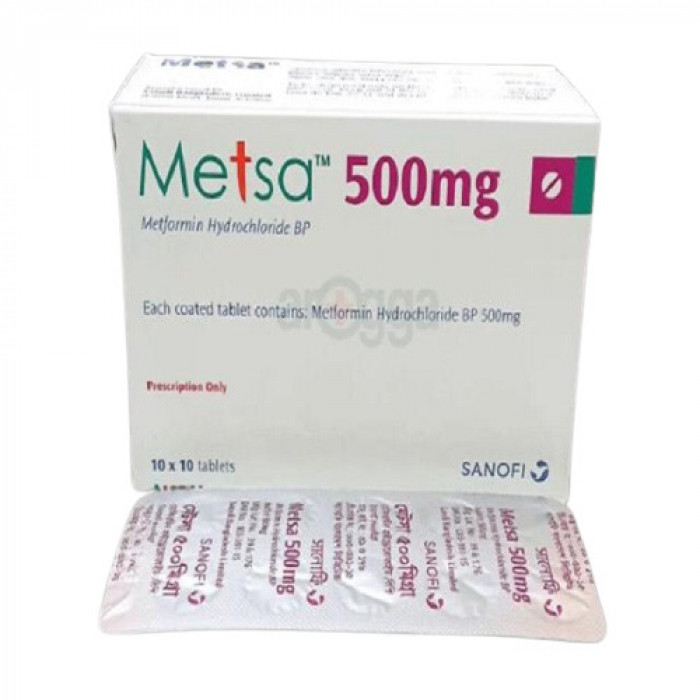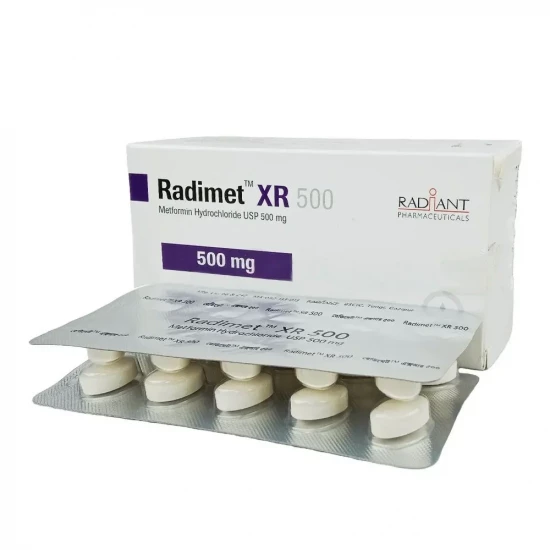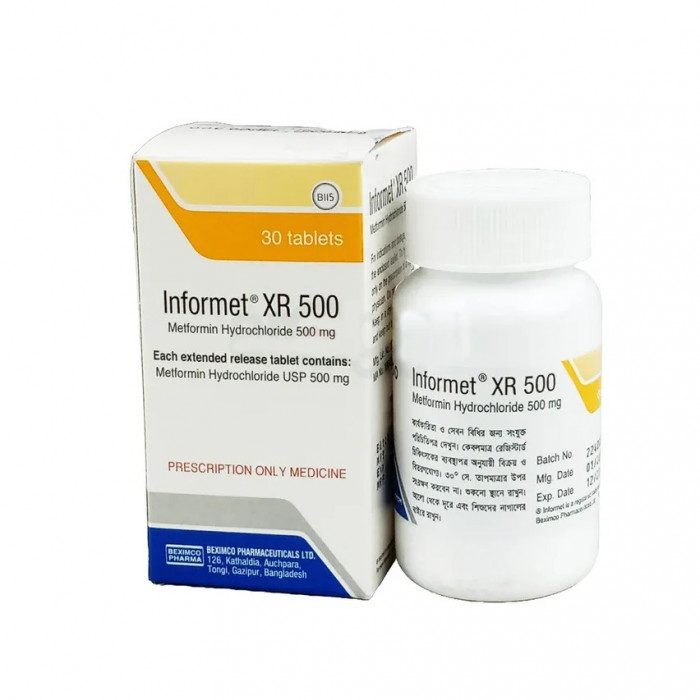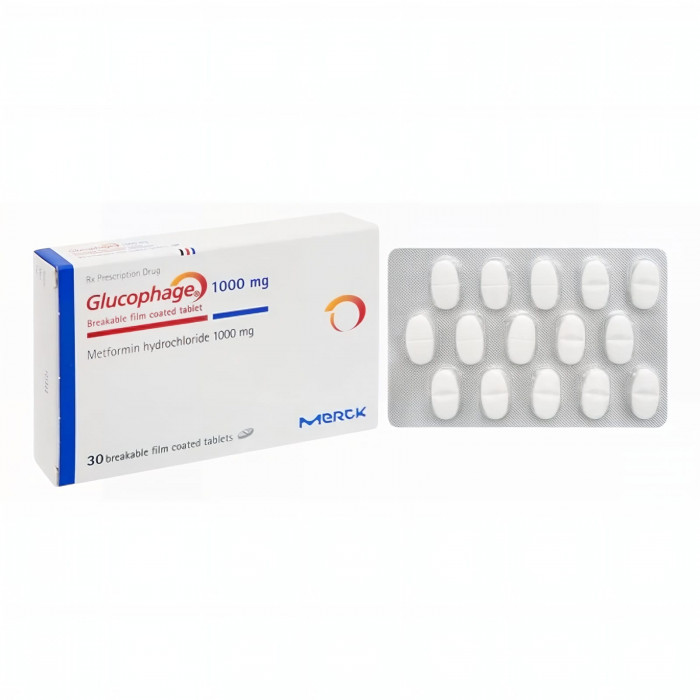
✔ 100% Authentic Product
👁️ Currently Viewing 1510
Metsa 500mg 10pcs
Type: Tab. Generic Name:Metformin hydrochloride 500mg.Manufacturer.Distributor: sanofi aventis bangladesh ltd.
Discount
Price: ৳ 29
MRP:
৳
30.1
5%
Off

100% Genuine Products, Guaranteed

Safe & Secure Payments, Always

Fast, Secure & Efficient Delivery

Proper Packaging
 Cash on Delivery - All over Bangladesh
Cash on Delivery - All over Bangladesh Regular Delivery - 12-24 Hours, Dhaka City* Charge Tk.39-59
Regular Delivery - 12-24 Hours, Dhaka City* Charge Tk.39-59 Regular Delivery - 24-48 Hours, Other Cities* Charge Tk.99-110
Regular Delivery - 24-48 Hours, Other Cities* Charge Tk.99-110
 ফ্রি ডেলিভারিঃ - ৯৯৯ টাকা+ অর্ডারে, ঢাকা
শহরে
ফ্রি ডেলিভারিঃ - ৯৯৯ টাকা+ অর্ডারে, ঢাকা
শহরে ফ্রি ডেলিভারিঃ - ২৯৯৯ টাকা+ অর্ডারে, ঢাকার
বাহিরে
ফ্রি ডেলিভারিঃ - ২৯৯৯ টাকা+ অর্ডারে, ঢাকার
বাহিরে
100% Genuine Products, Guaranteed
Safe & Secure Payments, Always
Fast, Secure & Efficient Delivery
Proper Packaging
 Cash on Delivery - All over Bangladesh
Cash on Delivery - All over Bangladesh Regular Delivery - 12-24 Hours, Dhaka City* Charge Tk.39-59
Regular Delivery - 12-24 Hours, Dhaka City* Charge Tk.39-59 Regular Delivery - 24-48 Hours, Other Cities* Charge Tk.99-110
Regular Delivery - 24-48 Hours, Other Cities* Charge Tk.99-110 ফ্রি ডেলিভারিঃ - ৯৯৯ টাকা+ অর্ডারে, ঢাকা
শহরে
ফ্রি ডেলিভারিঃ - ৯৯৯ টাকা+ অর্ডারে, ঢাকা
শহরে ফ্রি ডেলিভারিঃ - ২৯৯৯ টাকা+ অর্ডারে, ঢাকার
বাহিরে
ফ্রি ডেলিভারিঃ - ২৯৯৯ টাকা+ অর্ডারে, ঢাকার
বাহিরে
✅ Description:
Indications
Treatment of type 2 diabetes mellitus, especially in overweight people, when food and exercise alone are unable to provide appropriate glycemic control.
Metformin can be used alone or in conjunction with other oral antidiabetic drugs or insulin in adults.
Metformin can be taken alone or in conjunction with insulin in children and adolescents as young as ten years old.
In overweight type 2 diabetes adult patients treated with metformin as first-line treatment following diet failure, there was a decrease in diabetic complications.
Pharmacology
Metformin is an antihyperglycemic medication of the biguanide class that is used to treat type 2 diabetes. Both baseline and postprandial plasma glucose levels are reduced. It has a different mode of action than sulfonylureas and does not cause hypoglycemia. Metformin increases insulin sensitivity by increasing peripheral glucose uptake and utilization. It lowers hepatic glucose production, lowers intestinal glucose absorption, and lowers hepatic glucose production.
Dosage & Administration
Metformin Hydrochloride Dosage: Metformin Hydrochloride dosage should be customized based on efficacy and tolerance, while not exceeding the maximum suggested daily dosages.
Adults: Metformin is usually started at 500 mg twice a day or 850 mg once a day, with meals. Increases in dosage should be done in 500 mg weekly increments or 850 mg every two weeks, up to a maximum of 2000 mg per day, given in split doses. Glucosamine can be administered at a maximum daily dose of 2550 mg per day to individuals who need more glycemic control.
Metformin 500 mg twice a day, with meals, is the standard beginning dosage for children. Increases in dosage should be done in 500 mg weekly increments up to a maximum of 2000 mg per day, given in split doses.
Metformin extended-release tablet should be swallowed whole, without being crushed, chopped, or chewed.
Adults should take 500 mg of Metformin XR once a day with their evening meal. Dose should be raised in 500 mg weekly increments up to a maximum of 2000 mg once day with the evening meal, or 1000 mg twice daily with supper as an option. Up to the maximum recommended daily dose, patients using Metformin quick release tablet may be switched to Metformin extended release tablet.
Children: Metformin extended release tablet has not been studied in children.
Renal impaired patient: Do not use Metformin in patients with eGFR below 30 mL/min/1.73 m2. Asses risk/benefit of counting if eGFR falls below 45 mL/min/1.73 m2.
Interaction
Carbonic anhydrase (Topiramate, Zonisamide) co-administration may raise the risk of lactic acidosis. Drugs that decrease Metformin clearance (Ranolazine, Dolutegravir, Cimetidine) may cause Metformin buildup. Metformin's effect on lactate metabolism can be amplified by alcohol.
Contraindications
Hypersensitivity to the active substance or to any of the excipients.
Any type of acute metabolic acidosis (such as lactic acidosis, diabetic ketoacidosis).
Severe renal failure (GFR <30 mL/min).
Acute conditions with the potential to alter renal function such as: dehydration, severe infection, shock.
Acute or chronic disease, which may cause tissue hypoxia such as: cardiac or respiratory failure, recent myocardial infarction, shock, Hepatic insufciency, acute alcohol intoxication, alcoholism.
Side Effects
Hemolytic anemia is a blood and lymphatic system disease that is not well understood.
Metabolism and nutrition disorders: Very rare: Lactic acidosis. Decrease of vitamin B12 absorption with a decrease of serum levels during long-term use of metformin. Consideration of such etiology is recommended if a patient presents with megaloblastic anemia. Cases of peripheral neuropathy in patients with vitamin B12 deficiency have been reported in post-marketing experience (frequency not known)
Taste disturbance is a common nervous system disease. Encephalopathy is a condition that is currently unknown.
Gastrointestinal disorders: Very common: Gastrointestinal disorders, such as nausea, vomiting, diarrhea, abdominal pain, and loss of appetite. These undesirable effects occur most frequently during the initiation of therapy and resolve spontaneously in most cases. To prevent them, it is recommended that metformin be taken in 2 or 3 daily doses during or after meals. A slow increase of the dose may also improve gastrointestinal tolerability.
Isolated instances of liver function test problems or hepatitis resolving after metformin cessation are extremely rare.
Skin and subcutaneous tissue disorders: Erythema, pruritus, and urticaria are extremely infrequent.
Pregnancy & Lactation
Uncontrolled diabetes (gestational or permanent) during pregnancy is linked to an increased risk of congenital malformations and perinatal death. When a patient intends to become pregnant or is pregnant, it is advised that diabetes be managed with insulin rather than metformin to keep blood glucose levels as near to normal as possible, reducing the risk of fetal abnormalities.
Metformin is secreted in human breast milk during breastfeeding. In breastfed newborns/infants, no harmful effects were found. Breastfeeding is not suggested when using metformin since there is insufficient data. The benefits of nursing and the possible danger of harmful effects on the kid should be considered while deciding whether or not to stop breastfeeding.
Precautions & Warnings
Metformin Hydrochloride is known to be eliminated in large amounts via the kidneys, and the danger of Metformin buildup and lactic acidosis rises as renal function declines. Metformin has been linked to a reduction in vitamin B12 levels. When combined with insulin or an insulin secretagogue, it raises the risk of hypoglycemia.
Storage Conditions
Keep the temperature below 30°C and away from light and moisture. Keep out of children's reach.
⚠️Disclaimer:
At ePharma, we’re committed to providing accurate and accessible health information. However, all content is intended for informational purposes only and should not replace medical advice from a qualified physician. Please consult your healthcare provider for personalized guidance. We aim to support, not substitute, the doctor-patient relationship.


























